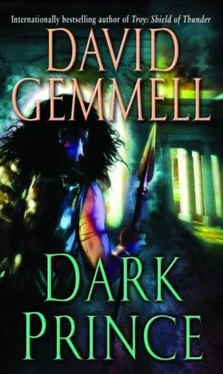* * *
The Spirit of Chaos surged into the body of Alexander. The eyes were open and through them Kadmilos could see a high, painted ceiling. He tried to move, but found the body paralysed. This was of small concern and he turned his powers inward, seeking out the poison soaked into the veins and nerves of the frail human form.
Foolish mortal, he thought, to believe that such a narcotic could foil the ambitions of a god. Swiftly he started to eradicate the drug. Feeling began to seep back into the body. He felt a cool breeze from a window to the left and a dull ache from the wounded leg. Ignoring the poison, he switched his attention to the injured limb, rebuilding the wasted muscle.
That was better! Pain of any kind was anathema to Kadmilos.
Returning to the poison, he cleaned it from lungs and belly.
Soon, he thought. Soon I shall awake.
He heard people in the room, but still the paralysis gripped the body. Footsteps sounded and he saw a shadow move into his range of vision. A dark-skinned man loomed over him.
'The eyes are incredible,' said the man. 'Truly he was blessed by the gods. It is a pity we cannot save them.'
'Are you ready to begin?' came the voice of Ptolemy.
'Yes, lord.'
'Then do so.'
Into Kadmilos' vision came a hand, holding a long spike forked at the tip.
'No!' screamed the Dark God, soundlessly.
The spike pressed hard into the opening of the left nostril, then drove up into the brain.
A City by the Sea, Time Unknown
Parmenion stared out over the harbour where great ships, larger than any he had seen, were docked, with curiously clad men moving about their enormous decks. Switching his gaze to the buildings surrounding the wharves, he marvelled at their complex design, the great arches supporting huge, domed roofs. Below in the narrow cobbled street he could hear what he imagined to be shopkeepers and stall-holders shouting about their wares. But the language was unknown to him.
He turned as Aristotle entered. The magus had another name here, and another appearance. His hair was long and white, a wispy beard grew from his chin, and he wore a long coat of velvet and trousers of embroidered wool.
'How are you feeling?' asked the magus .
Parmenion swung away from the window. Against the far wall was a mirror of silvered glass and the brilliance of its reflection still stunned the Spartan, though he had looked upon it many times during his five days in Aristotle's home.
He was healed of his wounds and the image in the mirror showed a young man in the prime of health — tall, slender, with a full life ahead of him. The clothes he wore were comfortable, but unnecessarily fussy he thought. The voluminous white shirt, with its puffed-out sleeves slashed with sky-blue silk, looked very fine, but the material was not strong. One day in the harsh Persian sun or the bitter rains of Phrygia, and the garment would be worthless, as indeed would be the ridiculous skin-tight leggings. And as for the boots! They were raised at the heel, making walking difficult and uncomfortable.
'I am well, my friend,' he answered, 'but what will I do in this place? I understand none of its customs, and the language I hear from the streets below is strange to me.'
'You will not be staying here,' Aristotle told him. 'Now that you are strong again I shall take you to a better world -
one which I think you will enjoy. But that is for later. Tonight we will eat fine food and drink strong wine, and all your questions will be answered.'
'You have learned the truth? You know what happened?'
'Yes,' answered the magus . 'It has taken a little time, but I think you will find the wait was worthwhile.'
Tell me.'
'Have patience. Such tales are best left for the evening.'
Throughout most of the afternoon Parmenion waited, but towards dusk he wandered through the house seeking the magus . In the north of the building was a flight of wooden stairs leading to a brightly-lit studio below the roof. Here he found Aristotle sitting at an easel, sketching a dark-haired woman who sat on a high-backed leather chair before him.
As the Spartan entered the woman smiled and spoke. He did not understand her words and merely bowed. Aristotle laid down his charcoal and stood. He said a few words to the woman, who stretched her back and rose. The magus walked her to the door, leading the way downstairs, then returned to the studio.
'I did not realize it was so late,' he said, reverting to Greek.
Parmenion was standing before the sketch. 'It is a good likeness. You have great talent.'
'Centuries of practice, my boy. Come, let us eat.'
After the meal the two men sat in comfortable chairs by an open leaded-glass window through which the stars could be seen glittering like diamonds on sable.
'What happened to Alexander?' asked Parmenion.
'He died some seventeen hundred years ago,' the magus answered, 'but in death he won his finest victory.'
'How so?'
'The Dark God took control of his body at the end. But Alexander had ordered it embalmed.'
'What difference could that make?'
'Kadmilos was spiritually joined to the body of Alexander. He could only be released from it when the body was destroyed by fire or consumed by carrion eaters, or rotted to nothing. But embalmed? Alexander's body would never rot and Kadmilos was trapped.
'When the King died there was a civil war among his generals. Ptolemy stole the embalmed body and took it to Egypt, to Alexandria, where he had a huge mausoleum built to accommodate it. For centuries men came from all over the world to gaze upon the still, perfect form of Alexander the Great. I myself stood before it with an emperor of Rome five hundred years after Alexander died. And Kadmilos was still a prisoner within. I could feel his evil pulsing through the crystal that held the body.'
'Is it still there?' Parmenion asked.
'No. Barbarians sacked Alexandria hundreds of years ago. But the priests of Alexander carried the crystal coffin into the mountains and buried it there, deep and far from the gaze of men. No one knows where now it lies. Save me, of course… for I found it. The body is still perfect, the Chaos Spirit trapped — perhaps for eternity.'
Parmenion smiled. 'Then no more will demon-possessed kings bring evil upon the world?'
'Not this demon, at least,' answered Aristotle, 'but there are others. There will always be others. But their powers do not rival those of the Dark God.'
'Poor Alexander,' whispered Parmenion. 'His life was cursed from the beginning.'
'He fought the demon with great courage,' the magus said, 'and he knew friendship and love. What more could a man want? But let us think of you. .'
'Where can I go?' asked Parmenion, with a sigh. 'What is there for me, Aristotle?'
The magus chuckled. 'Life. Love. It is time, I think, to say our farewells. There is someone waiting for you.'
'Who?'
'Who else but Derae?'
'I never went back. That was decades ago.'
Aristotle leaned forward, clapping his hand to the Spartan's shoulder. 'It is only Time. Have you learned nothing?'
The Gateway, Sparta, 352 BC
Derae drew the woollen cloak more lightly about her as the clouds covered the moon and the night winds swirled.
Six hours had passed since Parmenion walked back through the shimmering Gateway to the unknown world beyond.
She shivered and stared up at the cold stone pillars. The magus had asked her to wait here, but now she was alone beneath the empty sky.
'Derae!' called a voice, soft as the whisper of a distant memory. At first she thought she had imagined it, but it came again, tiny but insistent.
Читать дальше












